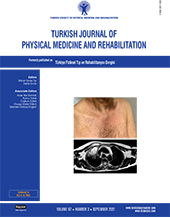Preoperative pain neurophysiology education for lumbar radiculopathy: A randomized-controlled trial
2 Department of Neurosurgery, Faculty of Medicine, Kütahya Health Science University, Kütahya, Turkey DOI : 10.5606/tftrd.2021.5495 Objectives: This study aims to investigate the postoperative short-term effectiveness of preoperative pain neurophysiology education on pain severity, kinesiophobia, and disability in patients undergoing lumbar surgery for radiculopathy.
Patients and methods: Between April 2019 and August 2019, a total of 41 patients (22 males, 19 females; mean age 52.1±9.5 years; range, 37 to 64 years) scheduled for lumbar radiculopathy surgery were randomized to receive either preoperative routine education only (control group, n=20) or a 70-min pain neurophysiology education in addition to preoperative routine education (intervention group, n=21). The patients were evaluated for the following outcomes prior to surgery (baseline) and at 12 weeks after surgery: low back pain and leg pain using Numeric Pain Rating Scale, disability using Oswestry Disability Index), and kinesiophobia using Tampa Scale for Kinesiophobia.
Results: There were no statistically significant differences in low back pain (p=0.121), leg pain (p=0.142), and the length of stay hospital (p=0.110) between the groups. However, the interaction effects of intervention group were superior to control group regarding disability (p=0.042) and kinesiophobia (p<0.001).
Conclusion: The addition of pain neurophysiology education to routine education following lumbar radiculopathy surgery yields significant improvements for disability and kinesiophobia, although no additional benefits is seen regarding the pain severity and length of stay in hospital in the short-term.
Keywords : Chronic pain, low back pain, neurosurgery, pain neurophysiology education, patient education, radiculopathy
















